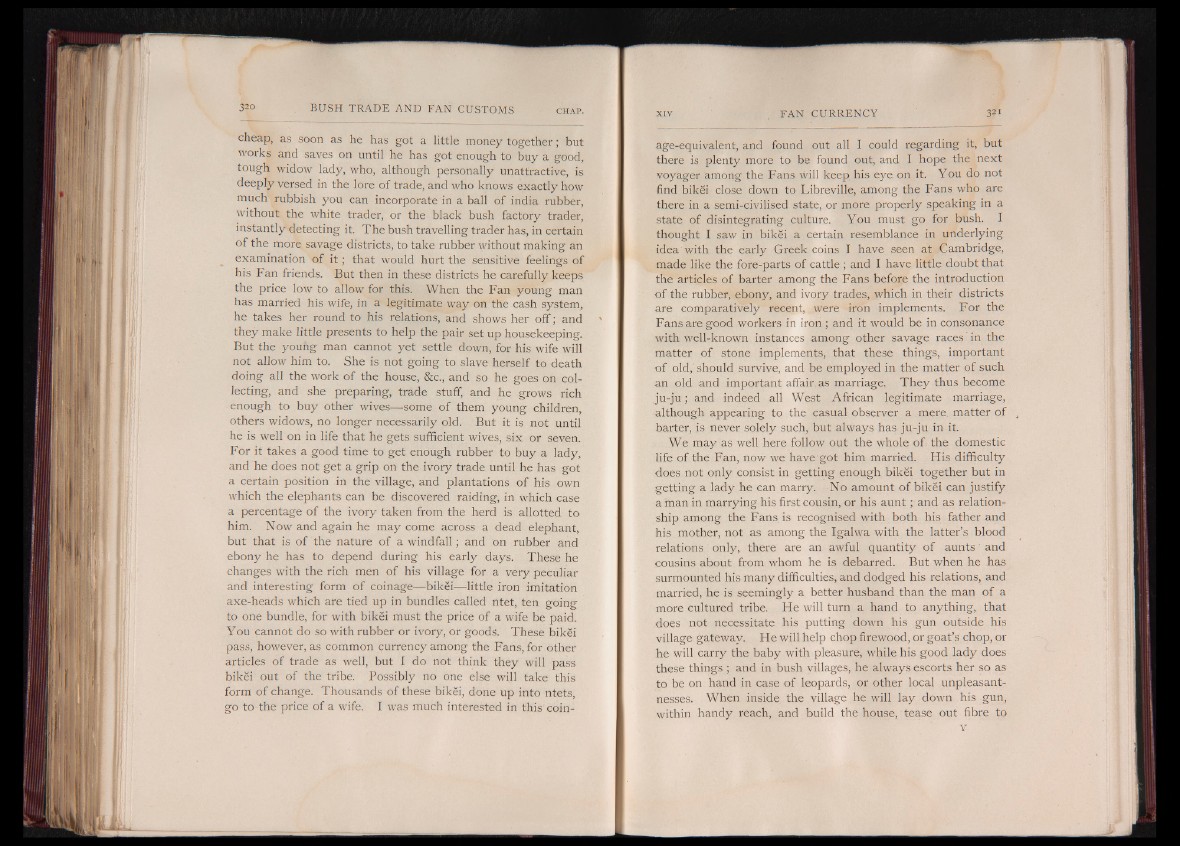
cheap, as soon as he has got a little money together; but
works and saves on until he has got enough to buy a good,
tough widow lady, who, although personally unattractive, is
deeply versed in the lore of trade, and who knows exactly how
much rubbish you can incorporate in a ball of india rubber,
without the white trader, or the black bush factory trader,
instantly detecting it. The bush travelling trader has, in certain
of the more savage districts, to take rubber without making an
examination of i t ; that would hurt the sensitive feelings of
his Fan friends. But then in these districts he carefully keeps
the price low to allow for this. When the Fan young man
has married his wife, in a legitimate way on the cash system,
he takes her round to his relations, and shows her o ff; and
they make little presents to help the pair set up housekeeping.
But the young man cannot yet settle down, for his wife will
not allow him to. She is not going to slave herself to death
doing all the work of the house, &c., and so he goes on collecting,
and she preparing, trade stuff, and he grows rich
enough to buy other wives— some of them young children,
others widows, no longer necessarily old. But it is not until
he is well on in life that he gets sufficient wives, six or seven.
For it takes a good time to get enough rubber to buy a lady,
and he does not get a grip on the ivory trade until he has got
a certain position in the village, and plantations of his own
which the elephants can be discovered raiding, in which case
a percentage of the ivory taken from the herd is allotted to
him. Now and again he may come across a dead elephant,
but that is of the nature of a windfall; and on rubber and
ebony he has to depend during his early days. These he
changes with the rich men of his village for a very peculiar
and interesting form of coinage— bikei— little iron imitation
axe-heads which are tied up in bundles called ntet, ten going
to one bundle, for with bikei must the price of a wife be paid.
You cannot do so with rubber or ivory, or goods. These bikei
pass, however, as common currency among the Fans, for other
articles of trade as well, but I do not think they will pass
bikei out of the tribe. Possibly no one else will take this
form of change. Thousands of these bikei, done up into ntets,
go to the price of a wife. I was much interested in this coinage
equivalent, and found out all I could regarding it, but
there is plenty more to be found out, and I hope the next
voyager among the Fans will keep, his eye on it. You do not
find bikei close down to Libreville, among the Fans who are
there in a semi-civilised state, or more properly speaking in a
state of disintegrating culture. You must go for bush. I
thought I saw in bikei a certain resemblance in underlying
idea with the early Greek coins I have seen at Cambridge,
made like the fore-parts of cattle; and I have little doubt that
the articles of barter among the Fans before the introduction
of the rubber, ebony, and ivory trades, which in their districts
are comparatively recent, were iron implements. For the
Fans are good workers in iron ; and it would be in consonance
with well-known instances among other savage races in the
matter of stone implements, that these things, important
of old,' should survive, and be employed in the matter of such
an old and important affair, as marriage. They thus become
ju -ju; and indeed all West African legitimate marriage,
although appearing to the casual observer a mere matter of
barter, is never solely such, but always has ju-ju in it.
We may as well here follow out the whole of the domestic
life of the Fan, now we have got him married. His difficulty
does not only consist in getting enough bikei together but in
getting a lady he can marry. No amount of bikei can justify
a man in marrying his first cousin, or his aunt; and as relationship
among the Fans, is recognised with both his father and
his mother, not as among the. Igalwa with the latter’s blood
relations only, there are an awful quantity of aunts and
cousins about from whom he is debarred. But when he has
surmounted his many difficulties, and dodged his relations, and
married, he is seemingly a better husband than the man of a
more cultured tribe. He will turn a hand to anything, that
does not necessitate his putting down his gun outside his
village gateway. He will help chop firewood, or goat’s chop, or
he will carry the baby with pleasure, while his good lady does
these things ; and in bush villages, he always escorts her so as
to be on hand in case of leopards, or other local unpleasantnesses.
When inside the village he will lay down his gun,
within handy reach, and build the house, tease out fibre to